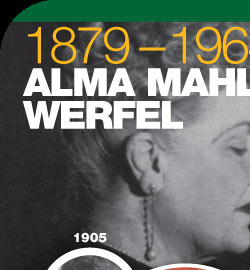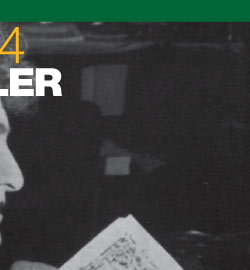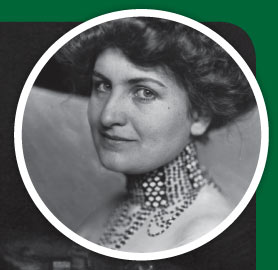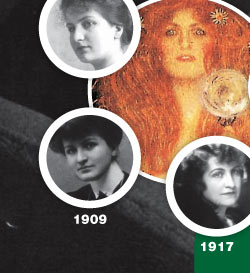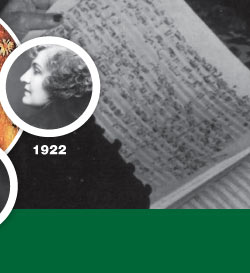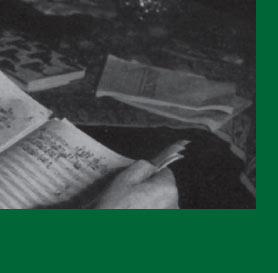|
Born in Vienna, on August 31st 1879, Alma grew up in a privileged environment.
Gustav Klimt,
brilliant Jugendstil painter, used to be in and out of her parents’
house, stealing a very first kiss from her, while composer was her composition tutor and became her first lover.
„The most beautiful girl in VieAlexander
Zemlinskynna“, they called Alma. And
few women have ever become so deeply involved with so many famous men
as her. Alma took a bold step, causing a sensation in the Vienna of
the day when in 1902 she married Gustav
Mahler who, as Director of the Royal Opera, held one of the most
powerful positions in the Viennese music scene. The price she paid was
high. She had to give up her own artistic aspirations, and the desire
to become a composer herself was nipped in the bud. Alma gave Mahler
two daughters, one of whom died young, while the other, Anna, became
a sculptress.
After eight years of marriage, in 1910, Alma sought consolation for
all her years of disappointment in the arms of the young German architect
Walter Gropius who, with the Bauhaus movement, later had a major impact on modern
architecture. The two became utterly absorbed in unbridled nights of
love. The result of this was an encounter between Gustav Mahler and ,
who was consulted by Mahler after the revelation of the relationship
between Alma aSigmund Freudnd Gropius. Mahler died shortly afterwards, in 1911.
In 1912 Alma began a passionate affair with the enfant terrible of
the Viennese art scene, the painter Oskar
Kokoschka. Apart from countless paintings and drawings which testify
to this anguished relationship, there was also a life-size
doll, a faithful reproduction of Alma down to the most intimate
details, which Kokoschka had made in 1919 in order to console himself
for the loss of his loved one.
Alma’s next marriage was to Walter Gropius. During all the years
in which he was revolutionizing the world of architecture, she remained
at his side. Yet neither did this liaison endure. After she had given
birth to the beautiful, short–lived daughter Manon,
the once so passionate relationship ended in agony and alienation.
At the age of 50, Alma was married a third time to Jewish poet Franz
Wefel, author of the novels »The Song of Bernadette«
and »The 40 days of Musa Dagh«, as well as successful theater
plays such as »Jacobowsky and the Colonel«. They spent their
honeymoon in the Orient, visiting Palaistina-Eretz-Israel, Jerusalem and Cairo. Werfel
saw in Alma his saviour, a goddess whom he was allowed to worship. The
burning of his works, followed the seizing of power by the Nazis, forced
Werfel into exile with Alma in the USA. Settling in Hollywood, he was
to die there in 1945.
In 1952 Alma Mahler-Werfel retired to New York, where she stayed to
spend the last years of her life. There she exposed all the trophies
she had collected throughout her life: paintings of Oskar Kokoschka,
scores of Gustav Mahler, manuscripts of Franz Werfel, and love letters
of Walter Gropius.
On December 11th 1964, Alma died in her apartment in Manhattan. |
